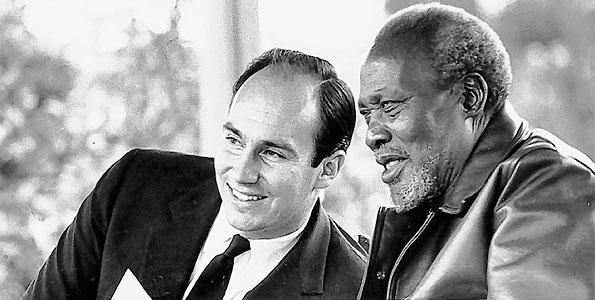How Kenyatta's Control of Nation Media Was Thwarted
Kenya’s first president, Mzee Jomo Kenyatta, once tried to get one of his relatives to control the Nation Media Group.
In a 2010 book titled The Birth of a Nation: The Story of a Newspaper in Kenya, Gerard Loughran, a former senior editor at the Daily Nation, narrates what transpired after Kenyatta made a proposition for one of his kinsmen to lead the firm.
After the Aga Khan opened Serena Hotel in a ceremony attended by Kenya’s founding father on February 16, 1976, Mzee introduced the businessman to his chosen candidate.
“This is my nephew, Muigai (Ngengi Muigai). He has just come back from America and I was wondering if it was possible to find a position for him in your newspapers,” the president proposed. Kenyatta’s son-in-law Udi Gecaga was also present.
The position the president was subtly asking the Aga Khan to appoint Muigai, was chairman of the holding company, Nation Printers and Publishers Ltd (NPP), as it was known at the time.
The head of the Ismaili community was put between a rock and a hard place to make a decision on the president’s request.
To accept would mean surrendering the company to state control and declining would have put him in crosshairs with the head of state.
He consulted widely from within the company and externally to find a solution. Most of the professional advice the Aga Khan received spelled doom for the future of the media house.
Muigai and Gecaga used their connections to secure an audience with the businessman who was reluctant to meet them without Kenyatta's presence.
As if putting the company in the hands of an insider from the powerful Gatundu group wasn't enough, Gecaga was the chairman of Lonrho East Africa, which owned The Standard, the Nation’s chief rival.
A meeting between the directors was set and the two relatives of the president were asked to appear and explain what value they would bring to the company.
The two were taken aback by the move, perhaps because of their relationship with the president.
Muigai, Kenyatta’s choice was so surprised, he didn’t have anything to say but on the other hand, Gecaga argued that the media house needed an injection of business acumen, new blood and so on, Loughran writes.
“I really wanted Muigai to answer but since you have spoken up, how would you feel if I suggested that I would nominate somebody to the board of Lonrho?" the Aga Khan asked.
Gecaga responded, “That’s different, I am not here as a representative of Lonrho, I’m here in my personal capacity.”
The businessman played mind games with the two claiming “I don’t see where the divide is. Could I also nominate somebody for you?" before concluding that “We will discuss with the board what contribution you might make to our group and we will let the president know.”
Despite backing from his professionals the Aga Khan still had to contend with the political implication of the decision to reject Kenyatta’s men. He ordered that a document be prepared to outline the worst-case scenarios.
One night, a number of politicians close to the president, made personal appeals to the Aga Khan not to proceed with the appointment during a visit to the Nairobi home of Sir Eboo Pirbhai, the astute and influential leader of the Ismaili community in Kenya.
The politicians included then-Vice President Daniel Moi, Finance Minister Mwai Kibaki and Attorney General Charles Njonjo.
When the time came for the Aga Khan to meet Kenyatta with his decision in mind, he was bold and frank about it.
He reiterated his love for the country, explaining his huge investments in Kenya to appeal to the president. He went on to describe how fulfilling Kenyatta’s request would put the company in jeopardy, because the public trust would decline, putting the livelihoods of its staff at stake.
The Aga Khan also proposed selling the firm to the president if he so wished, but insisted that the head of state would make a better legacy by cementing independence of the media.
“No, he said, the government did not want to buy the Nation, and as for Muigai, while he found it difficult to go back on his promise, he would accept the Aga Khan’s judgment on the matter. They parted amicably and the Aga Khan returned to Europe the same day,” Loughran's book reveals.
- 4532 reads
 Ismaili.NET - Heritage F.I.E.L.D.
Ismaili.NET - Heritage F.I.E.L.D.